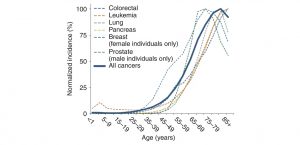Waxman Cancer Research Identifies Seven Reasons Why Aging and Cancer Research Matters
This year, SWCRF will directly allocate $1.1 million toward specific aging and cancer research. Additionally, the Foundation has formed partnerships with The Mark Foundation for Cancer Research, Israel Cancer Research Fund, Albert Einstein School of Medicine, Melanoma Research Alliance, and Tisch Cancer Institute at Mount Sinai to expand its International Network for Aging and Cancer Research Program and further investments in aging and cancer research. These collaborations are in addition to the ongoing Partnership for Aging and Cancer Research Program with the National Cancer Institute and National Institute on Aging launched in 2018.
“We must dispel the notion that getting cancer later in life is a normal or inevitable part of aging. Cancer can be prevented,” said Dr. Samuel Waxman, SWCRF CEO and Founder. “By focusing research on understanding the fundamental aspects of why aging increases cancer risk as well as how it impacts its treatment, we can advance preventions and new therapeutics for all forms of cancer.”
Here are seven reasons why aging and cancer research matters:
1) Aging is the Primary Risk Factor for Cancer: Aging stands as the single most significant risk factor for cancer development. Cumulative genetic changes and alterations in cellular processes increase the likelihood of cancer as we age. A comprehensive understanding of aging processes holds the key to better preventions, early detection, and improved treatments.
2) Prevention is Better Than a Cure: Research in aging and cancer goes beyond finding cures; it explores ways to prevent cancer. Insights gained from this research could lead to lifestyle and environmental changes that could significantly lower the risk of developing cancer.
3) Identifying Biomarkers for Early Detection: Early detection is crucial for successful cancer treatment. Research into aging and cancer may reveal biomarkers that serve as early indicators of cancer, enabling more timely interventions and improved outcomes.
4) Paving the Way for Precision Medicine: Insights from aging and cancer research could revolutionize treatment by targeting underlying aging mechanisms. This may lead to novel drugs and advance precision medicine by understanding the unique molecular and genetic signatures of individuals.
5) Enhancing Healthy Longevity: Aging and cancer research aims not only to prolong life but to extend healthspans – the period of life spent free of disease, frailty, and disability. By studying aging, strategies to delay age-related diseases and promote healthier aging can be unlocked.
6) Addressing Disparities in Cancer Treatment for Older Adults: The lack of funding and representation of older adults in clinical trials results in treatment disparities. Aging and cancer research will contribute to more equitable and improved treatment strategies for older patients.
7) Reducing the Economic Burden of Disease: The economic cost of cancer treatment is immense. Aging and cancer research, through improved prevention, early detection, and treatment, can potentially reduce the financial strain on individuals and global healthcare systems.
In addition to the many research projects being funded, SWCRF also launched Aging AND Cancer, an open access, international journal, in partnership with Wiley Publishing. SWCRF also co-founded the International Center for Aging and Cancer in Hainan, China. For more information visit SWCRF Aging and Cancer.
About the Samuel Waxman Cancer Research Foundation:
The Samuel Waxman Cancer Research Foundation is an international organization dedicated to curing and preventing cancer. The Foundation is a pioneer in cancer research and its mission is to eradicate cancer by funding cutting-edge research that identifies and corrects abnormal gene function that causes cancer and develops minimally toxic treatments for patients. Through the Foundation’s collaborative group of world-class scientists, the Institute Without Walls, investigators share information and tools to speed the pace of cancer research. Since its inception in 1976, the Samuel Waxman Cancer Research Foundation has awarded more than $120 million to support the work of more than 200 researchers across the globe.
I: @waxmancancer | F: WaxmanCancer | X / T: @waxmancancer
Norah Lawlor
Lawlor Media Group, Inc.
+1 212-967-6900
email us here
Visit us on social media:
Facebook
Twitter
LinkedIn
Instagram
Legal Disclaimer:
EIN Presswire provides this news content "as is" without warranty of any kind. We do not accept any responsibility or liability for the accuracy, content, images, videos, licenses, completeness, legality, or reliability of the information contained in this article. If you have any complaints or copyright issues related to this article, kindly contact the author above.


